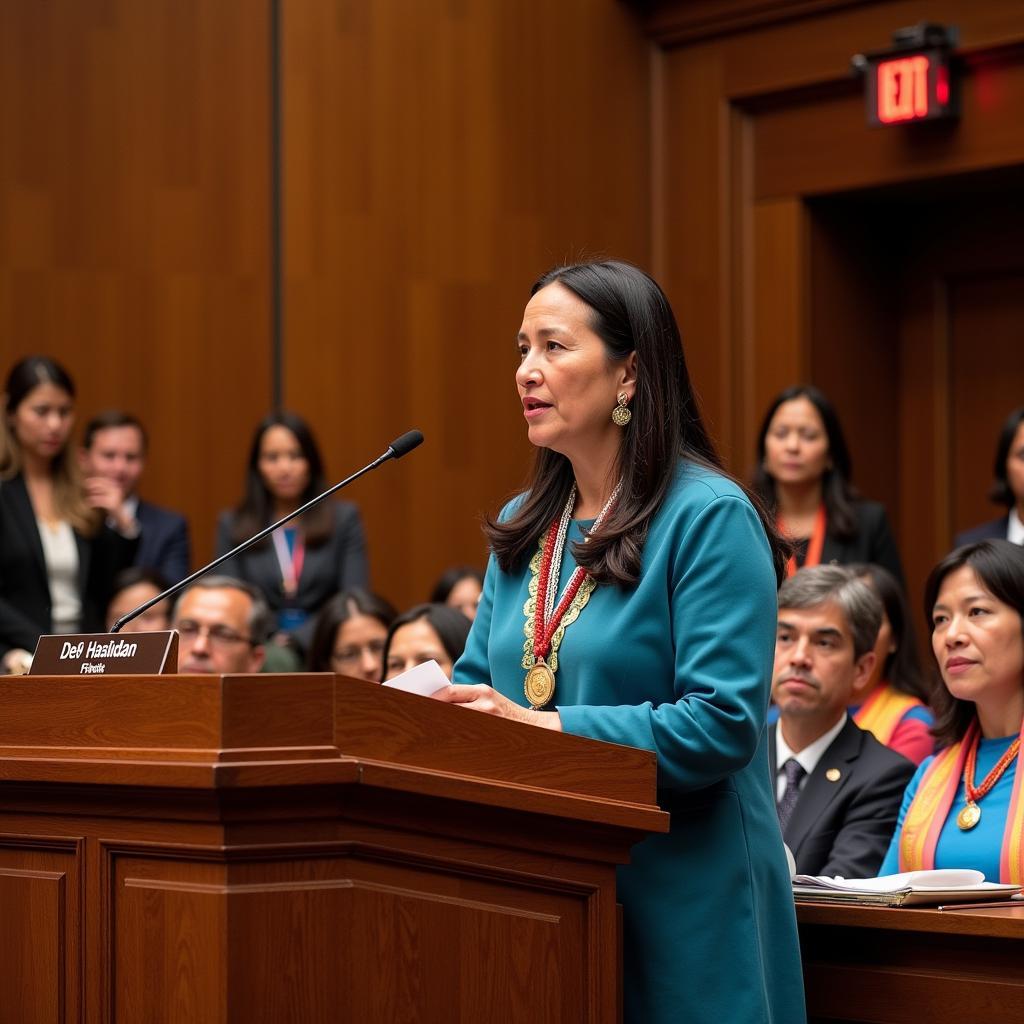Deb Haaland, Elizabeth Warren, and the Fight for Indigenous Rights
November 1, 2024Deb Haaland and Elizabeth Warren are two prominent figures who have championed Indigenous rights. While their approaches may differ, their shared commitment to addressing historical injustices and empowering tribal communities is evident. This article explores their contributions and the broader context of Indigenous rights advocacy in the United States.
Understanding the Context of Indigenous Rights
The history of Indigenous peoples in the United States is marked by displacement, dispossession, and broken treaties. From the forced removal of tribes from their ancestral lands to the ongoing struggles for sovereignty and self-determination, the fight for Indigenous rights has been a long and arduous journey. The legacy of these injustices continues to impact Indigenous communities today, manifesting in disparities in health, education, and economic opportunity.
Deb Haaland: A Historic Appointment and a Powerful Voice
Deb Haaland’s appointment as Secretary of the Interior marked a historic moment for Indigenous representation in the US government. As the first Native American cabinet secretary, she brought a unique perspective and lived experience to a department with significant responsibilities related to tribal affairs. Haaland’s leadership has focused on prioritizing tribal consultation, protecting sacred sites, and addressing the climate crisis’s disproportionate impact on Indigenous communities. Her work reflects a deep understanding of the complex challenges facing tribal nations and a commitment to honoring treaty obligations.
 Deb Haaland Addressing Tribal Leaders
Deb Haaland Addressing Tribal Leaders
Elizabeth Warren and her Advocacy for Tribal Sovereignty
Senator Elizabeth Warren has been a vocal advocate for Indigenous rights throughout her career. She has consistently supported legislation aimed at strengthening tribal sovereignty, protecting Native American languages and cultures, and addressing the crisis of missing and murdered Indigenous women. Warren’s work on the issue of payday lending has also had a significant impact on tribal communities, as these predatory practices often disproportionately target vulnerable populations.
The Intersection of Haaland’s and Warren’s Efforts
While Haaland’s role within the executive branch focuses on implementing policy and managing federal agencies, Warren’s position in the Senate allows her to shape legislation and advocate for legislative change. Their combined efforts represent a powerful force for advancing Indigenous rights at both the executive and legislative levels. Their work highlights the importance of collaboration and cross-branch coordination in addressing complex social and political challenges.
What are the Key Issues Facing Indigenous Communities Today?
Indigenous communities face a range of complex challenges, including:
- Economic Disparity: High rates of poverty and unemployment persist in many tribal communities.
- Healthcare Access: Limited access to quality healthcare and high rates of chronic diseases are significant concerns.
- Environmental Justice: Indigenous lands are often disproportionately impacted by pollution and climate change.
- Cultural Preservation: Efforts to revitalize and preserve Native languages and cultural traditions are ongoing.
The Future of Indigenous Rights Advocacy
The fight for Indigenous rights is far from over. Continued advocacy, legislative action, and public awareness are crucial to achieving true equality and justice for Indigenous peoples. The work of leaders like Deb Haaland and Elizabeth Warren represents a significant step forward, but sustained effort is needed to address the systemic challenges that still exist.
The appointment of Deb Haaland and the ongoing advocacy of Elizabeth Warren, while focused on different aspects of government, represent a significant moment in the fight for Indigenous rights. Their combined efforts offer hope for a future where the sovereignty and self-determination of tribal nations are fully respected and the historical injustices faced by Indigenous communities are finally addressed.
FAQ
-
What is tribal sovereignty? Tribal sovereignty refers to the inherent right of tribes to govern themselves and make decisions about their own affairs.
-
How does climate change affect Indigenous communities? Climate change disproportionately impacts Indigenous communities, threatening their traditional ways of life and access to natural resources.
-
What can I do to support Indigenous rights? Educate yourself about Indigenous history and current issues, support Indigenous-led organizations, and advocate for policies that protect tribal sovereignty.
-
What is the Missing and Murdered Indigenous Women (MMIW) crisis? The MMIW crisis refers to the high rates of violence and disappearances affecting Indigenous women and girls.
-
How does Deb Haaland’s appointment impact Indigenous representation? Haaland’s appointment as the first Native American cabinet secretary is a historic milestone for Indigenous representation in the US government.
Need More Support?
For further assistance and information, please contact us:
Phone: 0396443476
Email: [email protected]
Address: 23 Tháng 3, Đắk Nia, Gia Nghĩa, Đắk Nông, Việt Nam
Our customer service team is available 24/7 to help you.